Influence Marketing Isn’t Easy, Isn’t Fun; But Is Rewarding
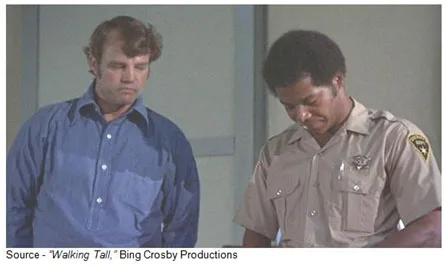
I enjoyed Robert Downey Jr. in Ironman. His appearance in the HTC One commercials left me wondering WTF!
Neil deGrasse Tyson in Cosmos made me want a spaceship just like his.
When he tweeted about the facts being pretty much right-on in Interstellar, I begged my wife to let me to see it (we did).
O.K., Downey got a couple of million bucks to hawk the HTC One and Tyson probably had to pay his own way into the movie.
HTC found out the hard way that celebrity endorsements suck.
It just isn’t credible, compelling or even worth talking about to have someone, even Ironman, stand up and say the product is awesome and your life will be empty without it.
But to have someone who kinda’ knows what he’s talking about say, “Hey, for the most part, this is spot on and you might want to enjoy it,” makes you (O.K., me) want to appreciate it.
You know, cough up $20 for two tickets, $15 for two boxes of popcorn and $5 for a pack of Frooti Tootis.
Tyson wasn’t an advocate or champion for the movie but he was an influencer for it.
His comments on social media created a buzz that the production company couldn’t have bought.
In the world of marketing, it’s called behavioral economics, understanding the motivations leading people to make a decision and/or take a specific action.
Tyson gave the movie street credibility by telling you you’re going to learn something about the universe around us, even as you’re being entertained.
There was no BS or association with the project but his expertise and understanding of the universe around us (and ability to interpret it in lay language) is respected and he freely shared his information and ideas.
That’s the kind of authenticity (especially in the technology industries) needed most to drive millions to want to learn more and buy.
We call them brand advocates or social media influences who love the brand, product, service and make it a point to not just support it but recommend it to friends, families, people who ask.
Don’t confuse these people who get paid to post, tweet and hustle for brands … people aren’t that stupid.
 I’m Yours – There are people who get paid to say nice things about a company/product and there are reviewers who receive, review products and are encouraged to retain/use them in their daily activities. The latter are valued friends to brands because they not only give an honest, credible review but also tell those who ask what they use in their daily activities and discuss their real life experiences on and offline.
I’m Yours – There are people who get paid to say nice things about a company/product and there are reviewers who receive, review products and are encouraged to retain/use them in their daily activities. The latter are valued friends to brands because they not only give an honest, credible review but also tell those who ask what they use in their daily activities and discuss their real life experiences on and offline.
Nearly everyone does his/her own research and comparison today.
With the Internet and web, it’s just too easy for people to validate their present decisions or start out with an idea of what they want/need and find the best product, service, solution available.
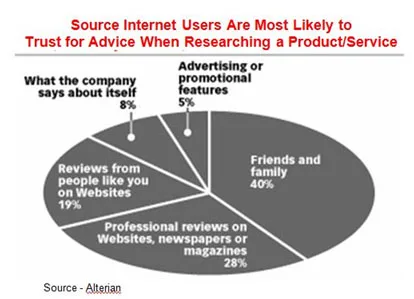 Weighted Credibility – People always turn first to friends and family when they are considering a purchase; and if they have real life experience, it carries tremendous credibility. But people increasingly go online to see what influential reviewers say about the product/service and visit the company website to read inputs from actual customers. At times, even modestly positive reviews are viewed as favorable by people because they’re credible.
Weighted Credibility – People always turn first to friends and family when they are considering a purchase; and if they have real life experience, it carries tremendous credibility. But people increasingly go online to see what influential reviewers say about the product/service and visit the company website to read inputs from actual customers. At times, even modestly positive reviews are viewed as favorable by people because they’re credible.
According to a study by Alterian, friends and family are the influentials people turn to first for recommendations. But equally important are professional reviewers and ordinary folks who purchased the product/service and want to share their experience – pro, con – with others.
It turns out that according to a study by Zuberance, regular folks will make an average of nine recommendations a year.
In fact, more and more people have found that sharing their information and insights are so personally rewarding that 16 percent of those in Zuberance’s study made more than 15 recommendations in a given year.
The problem for marketing folks (there’s no Big Data for it) is to put a value on the recommendations, guidance, assistance people provide offline.
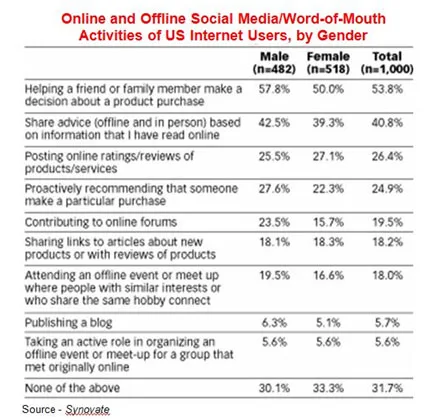 Online, Offline – The biggest challenge for marketers is to measure how important offline reviews/recommendations really are to the company/brand. It’s relatively easy to follow online review visitors and how the review is passed along but a review that is off the grid also has value.
Online, Offline – The biggest challenge for marketers is to measure how important offline reviews/recommendations really are to the company/brand. It’s relatively easy to follow online review visitors and how the review is passed along but a review that is off the grid also has value.
Zuberance found that only about half of the influencers/advocates posted their ratings and reviews online.
Millenials were more likely to share the information on social media while C-geners posted ratings and reviews, shared links, talked about the products on their blogs and Facebook pages or Tweeted the information.
Researchers at Synovate found that people involved in online business/industry forums were more likely to share their insights and information online:
- 65 percent give advice offline based on information found online
- 66 percent post online ratings and reviews
- 6 percent share links to articles and reviews
- 6 percent publish a blog
The reach and impact of advocates, influencers is at an all time high and spreading like a wildfire; but most ad and marketing folks treat it more as an annoyance because they can’t control the message.
What if the influencer doesn’t say something just right?
What if, OMG, they comment on a shortcoming, an issue or don’t stick to the message?
No problem … especially if the area is addressed immediately, explained better or even corrected.
Something wonderful happens when there’s a proactive response rather than “***** you.”
About.com found that company advocates, influences and people seeking information felt the company was more trustworthy.
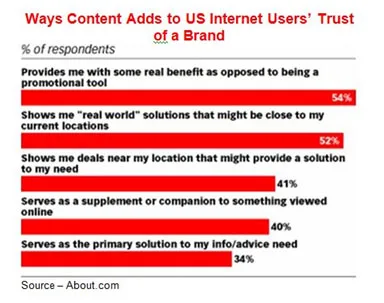 Not All Pitching – Marketers often treat social media as a one-way opportunity to pitch or sell something but consumers also find as much value in a company/brand that addresses general areas of interest/concerns regarding issues/problems only peripherally related to a product. Sound advice increases the consumers trust in the firm.
Not All Pitching – Marketers often treat social media as a one-way opportunity to pitch or sell something but consumers also find as much value in a company/brand that addresses general areas of interest/concerns regarding issues/problems only peripherally related to a product. Sound advice increases the consumers trust in the firm.
The global audience (79 percent) said that firms that responded in a positive, pro-active manner were more accurate, had a greater level of expertise, were more responsive and operated in a more transparent, ethical manner.
That doesn’t make a review that is anything less than five stars and right-on any easier for marketing to show to the boss.
They want you to show them that the buzz is out there, that is developing positive reactions, building a strong audience, is producing favorable conversations and producing results for the company.
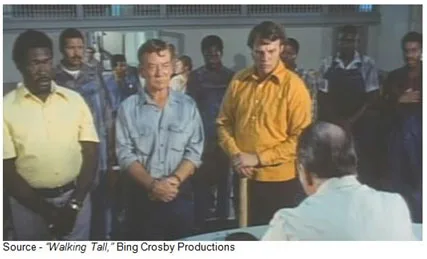 Well-earned credibility may not always be comfortable but just remember what Buford said, “It’s not the fine that’s important. It’s the principal of the thing. You got public respect.”
Well-earned credibility may not always be comfortable but just remember what Buford said, “It’s not the fine that’s important. It’s the principal of the thing. You got public respect.”
Which is more important to you? Ironman or the entire Cosmos?
# # #